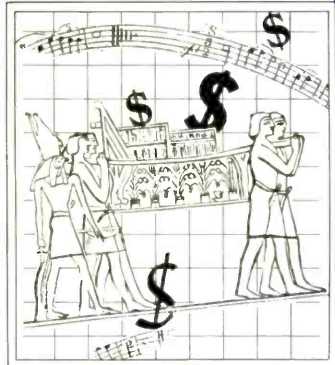A LEVY IS A TOLL IS A TAX

Call It What You Will
"Rough justice" was what Jason Berman, president of the Recording Industry Assn. of America (RIAA), called an agreement to seek legislation establishing a new royalty on digital audio recorders as well as any form of media for them. The compromise was announced at a hastily announced press conference July 11 in Manhattan's New York Hilton Hotel by Gary Shapiro of the Electronic Industries Assn., Edward P. Murphy, president and CEO of the National Music Publishers Assn. (NMPA), and John Roach, president and CEO of Tandy Corp., in addition to Berman.
The royalty for recorders would be 2% of the maker's wholesale price or customs value with an $8 maximum and $1 minimum, while units with two or more recorders would be subject to a $12 cap. Both caps can be adjusted upwards after five years, though the minimum is a fixed fee. A flat rate of 3% would be applied to blank digital audio media.
Record companies will receive the largest chunk of the royalty pie, 38.41%, with 25.6% going to featured artists, while songwriters and music publishers each get 16.66%. Tiny slices go to the American Federation of Musicians, 1.75%, with the American Federation of Television and Radio Artists receiving 0.92%. Other key provisions of the proposed legislation are that all consumer-oriented digital audio recorders must contain the Serial Copy Management System (SCMS) circuitry, which would prevent making digital copies of copies, and that consumers would be specifically exempted from any potential copyright infringement lawsuits for having made either analog or digital recordings for private, noncommercial use. Further, the proposals would apply to all present and future digital audio recording technologies.
A press release handed out at the conference by the NMPA announced that Federal Court in Manhattan had approved an agreement to "dismiss without prejudice" a class-action suit against the Sony Corp. Originally brought July 9, 1990, the suit contended that "unauthorized home taping on DAT recorders would displace sales of Compact Discs, cassettes, and records ...." The plaintiffs were Sammy Cahn, Hal David (for Jac Music Co ), Trio Music (owned by Jerry Lieber and Mike Stoller), Fort Knox Music, and Peer International. Four songs were involved: "Three Coins in the Fountain," "What the World Needs Now is Love," "Fever," and "Walk Like an Egyptian." In discussing the ramifications of the proposal, Shapiro called the royalty "an ordinary part of doing business, which paid for a very clear right, one equivalent to a patent." He said that all significant audio makers had been polled and that the overwhelming majority of the EIA board had voted in favor of the agreement. Asked about the total amount of money that would be generated by the new levy, Shapiro--clearly with tongue in cheek--termed it "equivalent to the lawyer's fees to date." U.S. Representative William J. Hughes, chairman of the Subcommittee on Intellectual Property and Judicial Administration, told The New York Times, "It is very significant that the major players have gotten together." His subcommittee should be assigned the measure after it is introduced in Congress this fall.
The passage of the legislation could set the stage for another full-scale format war with the various combatants siding with the two developers of the Compact Disc. Philips entry into the digital recorder field, Digital Compact Cassette, is the subject of an article on its PASC data-compression system in this issue. The Mini Disc from Sony was described briefly in the August 1991 issue. --E. P.
(adapted from Audio magazine, Sept. 1991)
= = = =